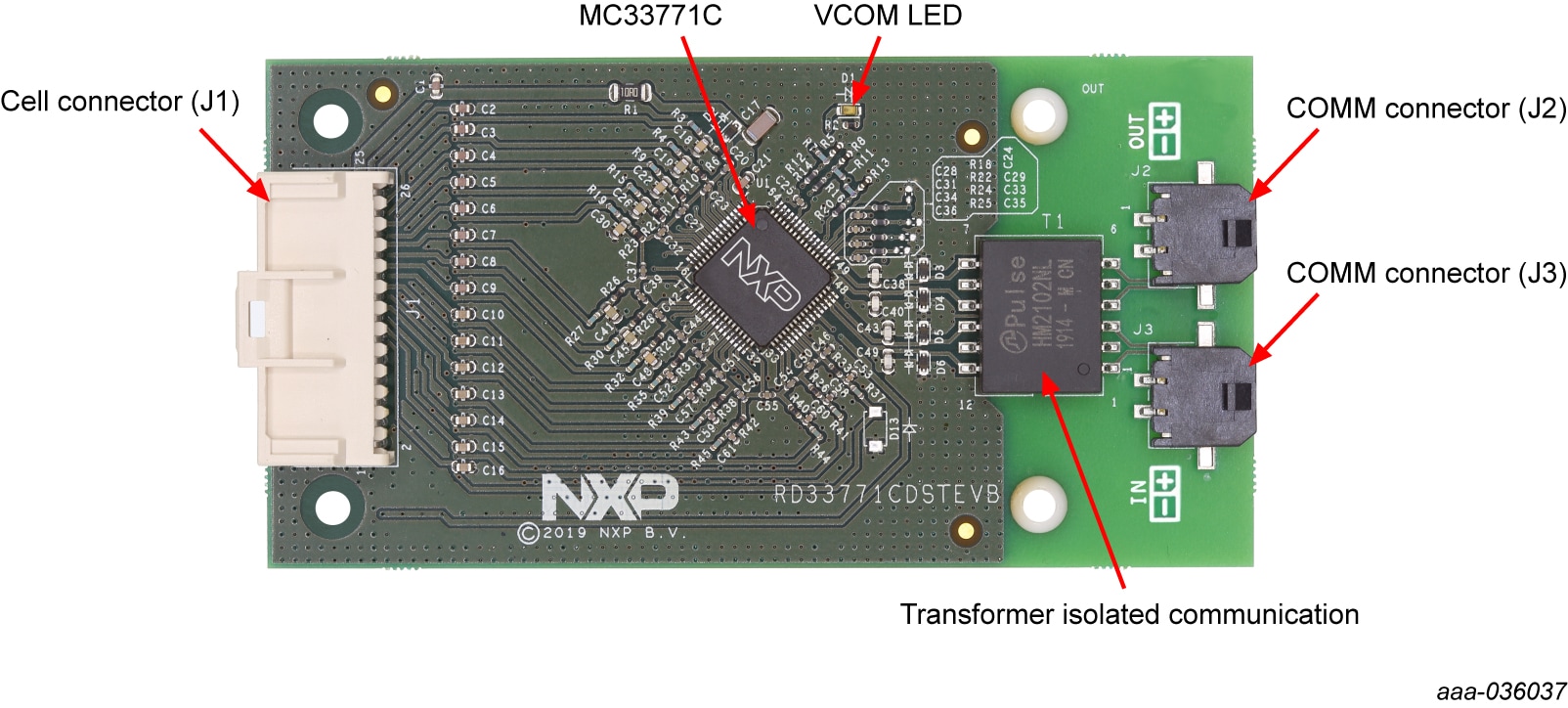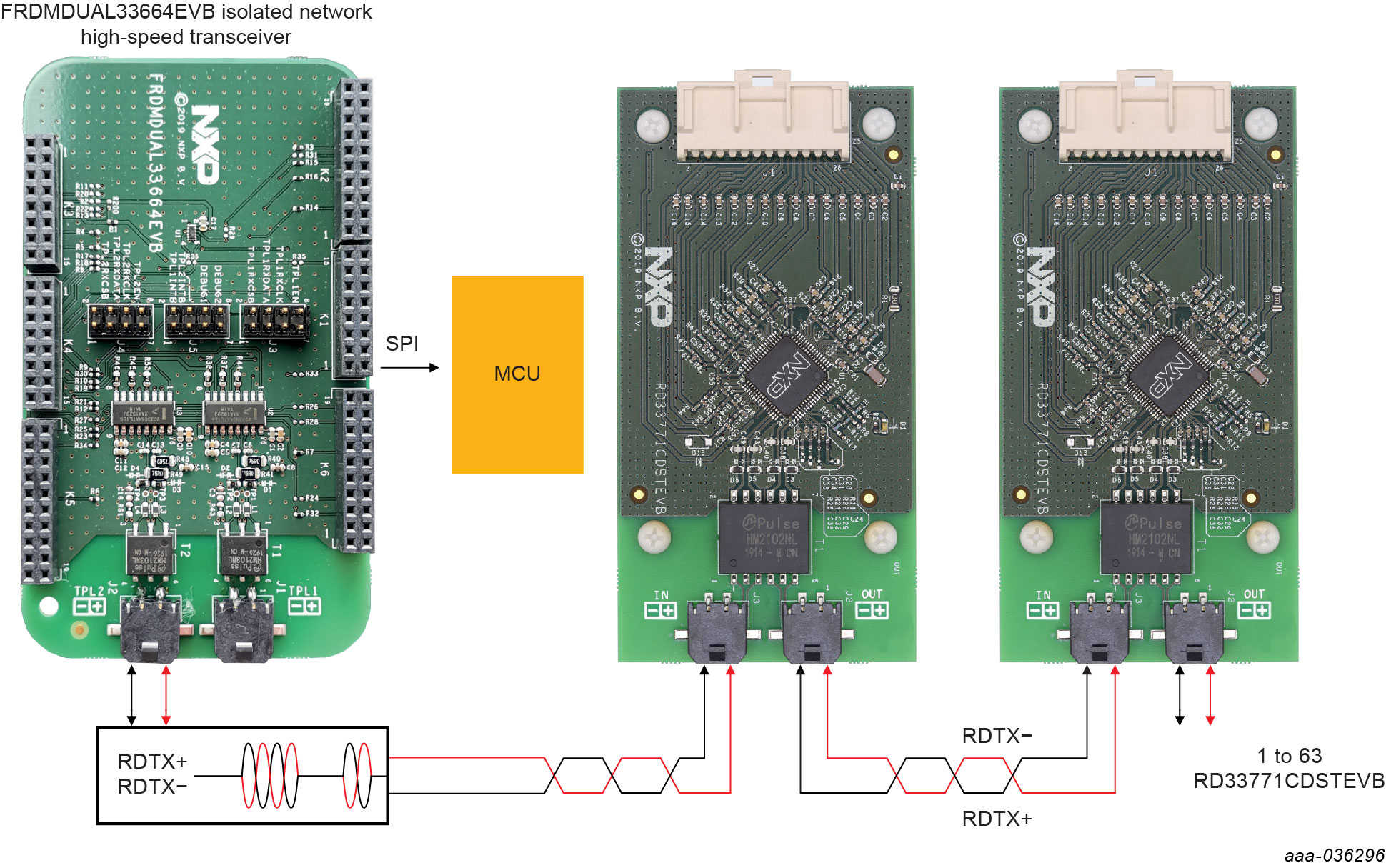Getting Started with the RD33771CDSTEVB
Contents of this document
-
Get Started
-
Get the hardware
-
Configure the Hardware
Sign in to save your progress. Don't have an account? Create one.

Purchase your RD33771CDSTEVB | TPL evaluation board for MC33771C
1. Get Started
The NXP analog product development boards provide an easy-to-use platform for evaluating NXP products. The boards support a range of analog, mixed-signal and power solutions. They incorporate monolithic integrated circuits and system-in-package devices that use proven high-volume technology. NXP products offer longer battery life, a smaller form factor, reduced component counts, lower cost and improved performance in powering state-of-the-art systems.
This page will guide you through the process of setting up and using the RD33771CDSTEVB board.
1.1 Kit Contents/Packing List
The RD33771CDSTEVB contents include:
- Assembled and tested RD33771CDSTEVB board in an anti-static bag
- 20 cm 26-pin cell terminal cable
- 20 cm TPL bus cable
- Quick Start Guide
1.2 Additional Hardware
In addition to the kit contents, the following hardware is necessary or beneficial when working with this kit.
- A 7- to 14-cell battery pack or a battery pack emulator, such as BATT-14CEMULATOR
1.3 User Manual
Refer to UM11343, RD33771CDSTEVB reference design for additional details on the featured components and board configuration.
2. Get the hardware
2.1 Board Features
- Daisy chain device connection
- LED indicator for operation mode
- Cell-balancing resistors
- Transformer isolation
- Cell sense input with RC filter
- GPIO: digital I/O inputs, wake-up inputs, convert trigger inputs, ratiometric analog inputs, analog inputs with absolute measurements
2.2 Board Description
The RD33771CDSTEVB serves as a hardware evaluation tool in support of NXP's MC33771C device. The RD33771CDSTEVB is an ideal platform for rapid prototyping of MC33771C-based applications that involve current, voltage and temperature sensing.
The RD33771CDSTEVB includes a transformer enabling communication in a high- speed isolated communication network. The information is digitally transmitted to a microcontroller for processing.
2.3 Board Components
Overview of the RD33771CDSTEVB: High voltage Lithium-ion battery management system reference design with transformer isolation.
2.4 Additional Board Support
Refer to UM11343, RD33771CDSTEVB reference design for additional details on the featured components.
3. Configure the Hardware
3.1 Battery Emulation Connection
A minimum of 7 cells and a maximum of 14 cells can be monitored. NXP provides a 14- cell battery emulator board, BATT-14CEMULATOR. This board provides an intuitive way to change the voltage across any of the 14 cells of an emulated battery pack and four voltage outputs to emulate four external NTC. The emulator board can be connected to the RD33771CDSTEVB connector J1 using the provided supply cable.
3.2 TPL Communication Connection
In a high-voltage Isolated application with a daisy chain configuration, up to 63 RD33771CDSTEVB boards may be connected. The TPL connections use the COMM connectors (J2, J3).
3.3 Additional Board Support
Refer to UM11343, RD33771CDSTEVB reference design user manual for additional details on the hardware configuration.
Design Resources
Learn More
Product Summary Page
The product summary page for MC33771C is at 14-Channel Li-Ion Battery Cell Controller IC.
Tool Summary Page
The tool summary page for RD33771CDSTEVB reference design is at Evaluation Board for MC33771C BCC with Isolated Daisy Chain Communication.
The page provides overview information, technical and functional specifications, ordering information, documentation and software. The Getting Started provides quick-reference information applicable to using the RD33771CDSTEVB reference design, including the downloadable assets.
References
In addition to our 'MC33771C: 14-Channel Li-ion Battery Cell Controller IC' page, you may also want to visit:
Product pages:
Tool pages:
- FRDMDUAL33664EVB: Isolated Network High-Speed Transceiver for Battery Management Systems
- BATT-14CEMULATOR: 14-cell Battery Pack to supply MC33771 EVBs


